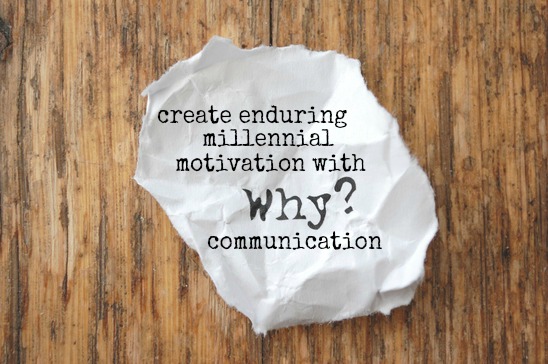German philosopher, Frederick Nietzsche, once said, “He who has a why can endure any how.” Vicktor Frankl, Holocaust survivor and the author of Man’s Search for Meaning, would agree that having a strong sense of meaning is the key to rising above. Millennial motivation in the workplace has a similar origin.
According to the Career Advisory Board, the No. 1 factor that Millennials (ages 21-31) wanted in a successful career was a sense of meaning. And nearly three-quarters of Millennials surveyed said that “meaningful work was among the three most important factors defining career success.”
By now it’s no surprise to people that Millennials value meaningful work and desire to have an impact in the workplace. However, what is surprising is how many leaders fail to deliver on this Millennial value.
Leaders of Millennials fall short in communicating the “why.” The why behind the organization, the why behind tasks or procedures, and the why behind the employee’s work.
Don Charlton, Founder and CEO of Jazz, provides a great example of communicating the why when it comes to workplace focus.
"Explain why they [Millennials] should change their behavior in a way that resonates. For example, let’s say you’re tired of seeing your Millennial’s phone light up with ANOTHER Facebook notification. You can’t just say, 'Facebook is for home.' Instead, say something like, 'People who advance quickly here avoid unnecessary distractions at work, and all those phone notifications could easily distract you from your goal of being successful at this company.' If you can keep a dialogue of 'If you want to be successful…do this…', Millennials are more apt to listen.”
Disengaged employees are the fault of the leader. Great leaders cast a vision of why. Great leaders also know that vision leaks so they communicate the why over and over and over again.
I recently heard Jim Collins, the best-selling author of Good to Great, say that teams should be sick of hearing the organization's why. Collins related it to reveling when he hears his kids repeat back to him before heading out of the house for the evening that they won’t drink or do drugs.
Collins has ingrained a message into his kids that will serve as a guiding principle (even if it comes with an eye-roll). Collins suggests that leaders ingrain the why into every single employee so that they have a meaningful lens in which to view work.
Millennials may be a different breed of worker but they are human. And humans have hopes, dreams, and a longing for meaning.
Communicate the why to win the head, heart, and hustle of the Millennial worker.
Question: How do you find the “why” of your work?
Consider Ryan Jenkins to be your next Millennial/Generation Y or Generation Z keynote speaker by clicking here...
![]()






